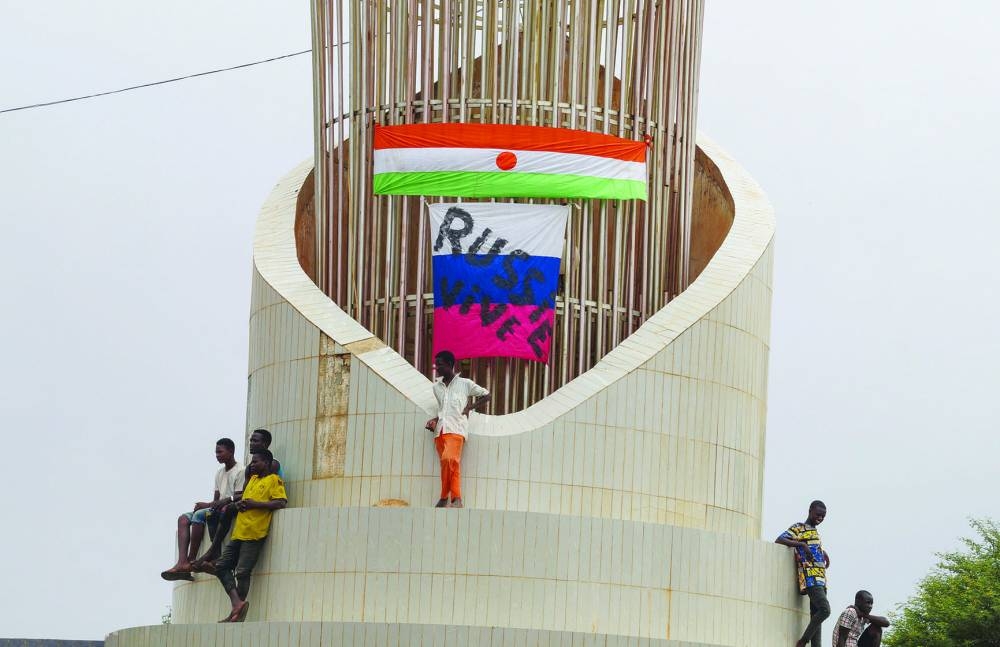Niger’s armed forces chief has declared his support for troops who said they had overthrown the government, despite a defiant stand by the country’s elected president and an outcry from the world community.
The latest target of a coup in the turbulent Sahel, President Mohamed Bazoum has been confined at his residence since Wednesday by members of his presidential guard.
Late in the evening, their leaders, calling themselves the Defence and Security Forces (FDS), declared that they had “decided to put an end to the regime” and all institutions were being suspended, the borders closed and a night-time curfew imposed.
Armed forces chief General Abdou Sidikou Issa swung his weight behind the putschists yesterday.
“The military command ... has decided to subscribe to the declaration made by the Defence and Security Forces ... in order to avoid a deadly confrontation,” he said in a statement.
Earlier, Bazoum defiantly stood his ground as condemnation of the putsch swelled from African and international organisations and allies France and the United States.
“The hard-won (democratic) gains will be safeguarded,” Bazoum said on Twitter, which is being rebranded as X. “All Nigeriens who love democracy and freedom would want this.”
Foreign Minister Hassoumi Massoudou told France24 television there had been a “coup bid” but “the whole of the army was not involved”.
“We ask all the fractious soldiers to return to their ranks,” he said.
Several hundred people in Niamey and a similar number in the town of Dosso took part in shows of support for the coup leaders, AFP journalists saw.
In scenes redolent of what happened in Mali following a coup there in 2020, some held Russian flags and chanted anti-French and pro-Russian slogans.
“France was unable to take care of our problems – we need to take our destiny in hand,” said their leader, who gave his name as Issouf and said he worked in a garage.
“We have always believed in the army’s actions and this time we are with them. For us this is joy,” said Boubacar Hamidou, a human rights activist who was among the crowd outside parliament.
Youths from the gathering in Niamey went to the headquarters of Bazoum’s PNDS party and ransacked it, setting fire to cars.
The coup leader appeared on national television urging “the population to remain calm”, after the violence.
“The National Council for the Safeguard of the Homeland (CNSP) calls on the population to remain calm and to refrain from any vandalism intended to destroy public or private property,” said Colonel Amadou Abdramane.
The president of neighbouring Benin, Patrice Talon, has been expected in the capital for mediation efforts, the head of the Economic Community of West African States (ECOWAS) said.
The landlocked state is one of the world’s poorest, experiencing four coups since gaining independence from France in 1960, as well as numerous other attempts – including two previously against Bazoum.
The 63-year-old Bazoum, is one of a dwindling group of elected presidents and pro-Western leaders in the Sahel, where since 2020 a rampaging religious militant insurgency has triggered coups in Mali and Burkina Faso.
Their juntas have forced out French troops and in the case of Mali, the ruling military have woven a close alliance with Russia.
The Niger coup leaders – 10 men in military uniform – had appeared on television overnight.
Colonel Abdramane announced they were taking power following “the continued deterioration of the security situation, poor economic and social governance”.
The parties in Niger’s ruling coalition denounced “a suicidal and anti-republican madness” and condemnation poured in from regional and global leaders.
ECOWAS and the African Union each blasted an “attempted coup d’etat” while UN Secretary-General Antonio Guterres attacked “the unconstitutional change in government”.
US Secretary of State Antony Blinken said he had spoken to Bazoum to offer support from Washington, which deploys about 1,100 troops in Niger.
France, a key ally which has 1,500 soldiers in Niger, called for “the restoration of the integrity of Nigerien democratic institutions”.
Russia – isolated internationally since invading Ukraine in February 2022 – joined nations appealing for Bazoum’s release and peaceful dialogue.
Bazoum took office after elections two years ago, in Niger’s first-ever peaceful transition since independence.
He had been interior minister and right-hand man to former president Mahamadou Issoufou, who voluntarily stepped down after two terms.
However, an attempted coup took place just days before Bazoum’s inauguration, according to a security source at the time.
A second bid to oust Bazoum occurred last March “while the president ... as in Turkiye”, according to a Niger official, who said an arrest was made.
The nation of 22mn is two-thirds desert and frequently ranks at the bottom of the UN’s Human Development Index, a benchmark of prosperity.
Niger is also struggling with two religious militant campaigns – one in the southwest, which swept in from Mali in 2015, and the other in the southeast, involving religious militants from northeastern Nigeria.
“We hope the army coming to power will resolve the security crisis. Today terrorism has uprooted so many villages ... our children have become widows and our grandchildren orphans,” said Hadjia Aiss, an elderly woman who was among the crowd outside parliament.

Supporters of the coup are seen near the Russian and Niger flags at the National Assembly in Niamey.
